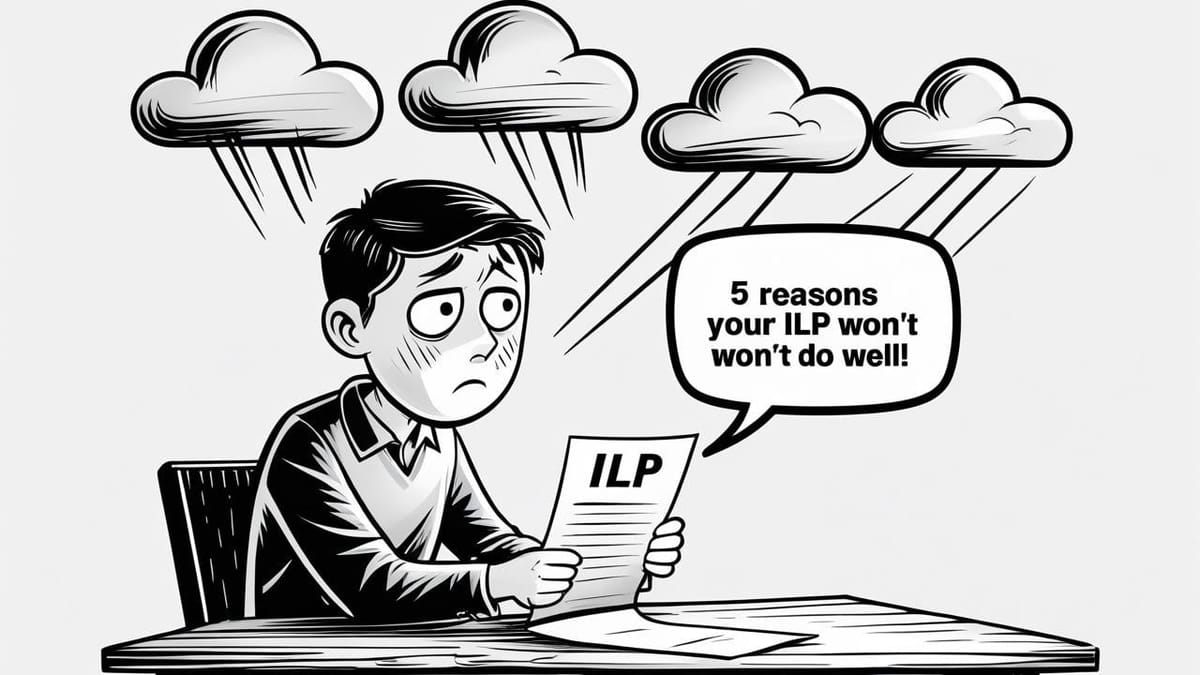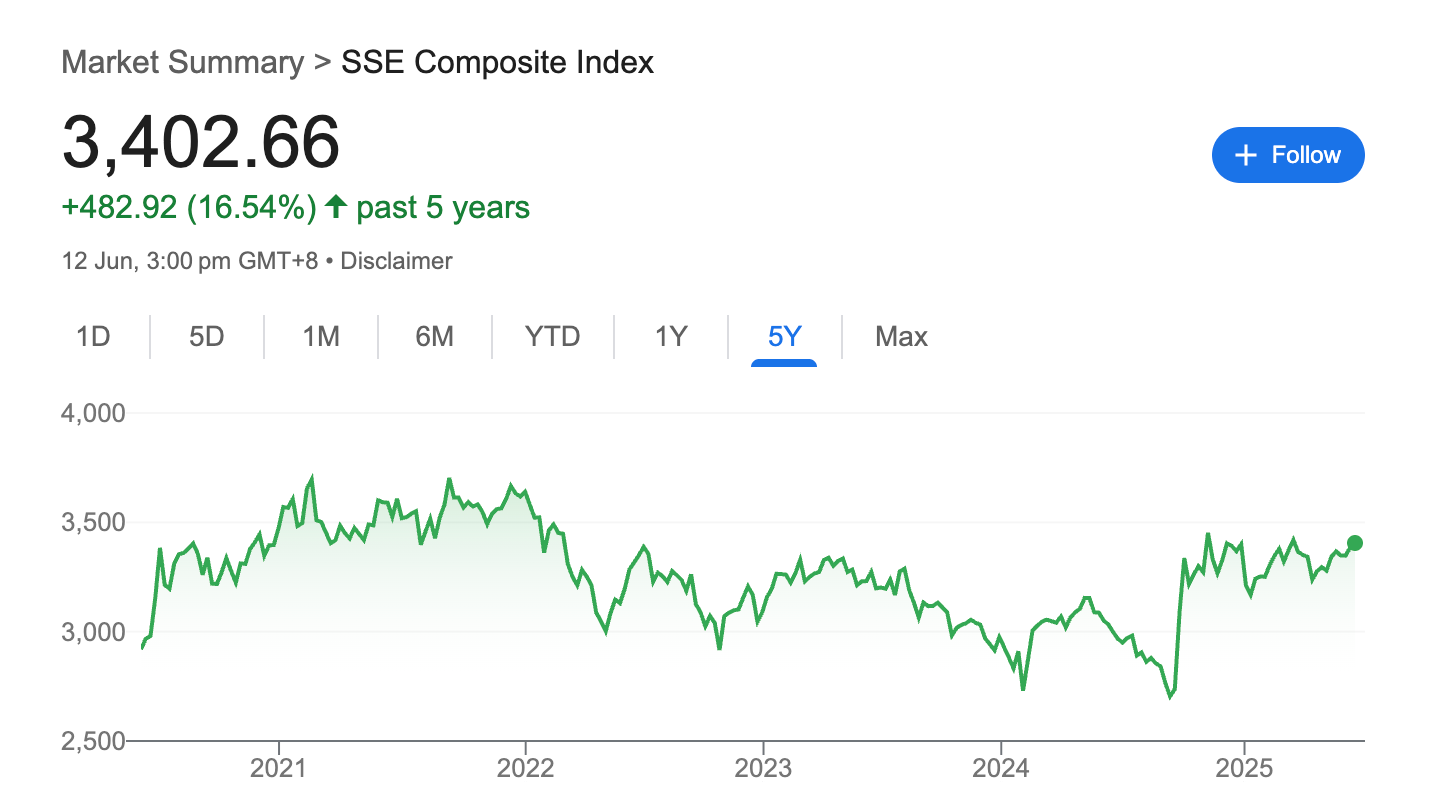5 reasons your ILP won’t do well!
Allocation in bonds, Guesswork, Absence of active management, Cost of Insurance, Mismanaged expectation

On reddit singaporefi, there’s plenty of people seeking advice from the online community.
“what should i do with my ILP”
“i regret buying this, how?”
These pleas usually follow a barrage of well-meaning advice, some are well justified and some are biased
But have we considered, why is this still an issue in 2025?
We live in a time where information is abundant and readily available. Surely, investors will do some due diligence before committing right?
Perhaps it’s the salesman or the agents that’s pushing for the product.
I recently came across a tiktok video where a financial advisor defended his position on ILP. He said because the product is MAS approved, that must mean there are merits to it.
Is this statement false?
In my opinion, the product contributed to the issue but is not THE ISSUE.
A commonly cited reason against ILP is high fees. 2%, 3% maybe 4% fees.
But If you look at the hedge fund industry, the standard fee structure is 2 on 20. It comes with lock in period too! (albeit likely shorter than ILP)
2% annual management fee with 20% performance fee.
So clearly, fees alone cannot be the issue.
If a hedge fund manager fail to perform, i’m certain the investor will be upset the same way as the ILP investor
If your investment makes you 12%. are u okay paying 3%?
If your investment makes you 8% consistently, are you okay to keep it going for your retirement?
So the crux of the issue is mismatched expectation of returns.
Or bluntly put. Poor returns.
As investor, you are not satisfied with the returns. You do not believe the instrument will take you to your goals.
Here are 5 reasons why i think many ILP will not do well
- Allocation in bonds
Are you aware of the historical returns of bond?
NYU published these data recently. The average return for corporate bonds between 1928-2024 is 6.59% p.a
Bond is typically added to an investment portfolio for risk management.
However, investors have to ask themselves if it’s justifiable paying 2-3% fees to buy into bonds when the returns are 6-7%.
Typically a balanced portfolio will have 50% bonds, which means half the money will earn no more than 3%+. Your returns have been capped by the asset allocation.
On its own, it’s fine. But with high fees, it becomes an issue.
- Guesswork
The funds in ILP are often recommended by advisors or selected by clients. Most clients will seek guidance from advisors. But how do advisors decide what to recommend?
Are the recommendations based off a hunch or guesswork?
There was a period where the world is optimistic with china and their stock market. But the stock market isn’t the economy.

The shanghai composite index returned a total of 16.56% over the last 5 years (2020-2024). The index grew by 3.11% p.a
The same 5 year period, China’s GDP grew by 4.86% p.a
If an ILP had heavy allocation to China, it will not have done well compared to global or US exposure.
I’m not saying that we should not invest in China. But if you were invested in China, why?
Was it because of a sound reasoning? Or was it guesswork?
How many times will you be able to guess heads when flipping a coin?
- Absence of active management
If you’re on a plane and it is flying in the wrong direction. How soon will you want the captain to adjust the flight path?
In the case of active management, the advisor acts as the captain.
If the portfolio was started on the basis of active fund selection, are there rebalancing and switches being done?
If the portfolio is set and forget, is the fund which you have forgotten being monitored by anyone?
If none of these are happening, what active management are there?
And how confident are you that the portfolio will do well?
I’m not a strong believer of active investing. Evidence have shown that a passive index portfolio will outperform many well managed active portfolio. Let alone, a poorly managed one.
Should we even be surprised that an “actively managed” ILP will not do well if it is not even managed
- Cost of Insurance
ILPs first came out as insurance products. It was designed for the purpose of protection but some have bought under the guise of investments.
In recent years, ILPs have evolved and there’s ILPs for protection and investments now.
Many of the ILPs that were sold as insurance products simply will not perform in the long run because of the escalating cost of insurance. The older you get, the more you pay, the lesser is your investment returns.
Can we fault the product? Or should we fault the agent who sold the product?
For the people who bought it for the purpose of insurance, they are less likely to see the lack lustre investment return as an issue.
But for those who were sold the idea wealth accumulation, it is quite likely they will show up disappointed in years to come.
The idea of having 1 product to solve insurance and investment sounds nice, but the reality is far from ideal.
- Mismanaged expectation
If you have an ILP, what did your advisor promise you when you bought it?
Did they show you some documents with columns of 4% & 8%? (It’s part of the policy illustration)
Did they throw in terminologies like sign up bonuses or loyalty bonus?
What did they promise you?
I would speculate that many plans were sold without setting the right expectations. Without expectations set, clients will form their own.
How can an ILP do well if the expectations were not even set.
How do we know our child passed their exam if we don't know the passing score?
For those who managed to set realistic promises, the challenge is to deliver on them. But are these advisor still around to uphold them?
Summary
There are many contributing factors to a poor ILP experience and often times it’s due to the human factors in the investment management process.
The very idea of removing human errors by automating through an ILP or outsourcing to “professional” don’t seem to be working out very well for many.
I hope this article provides a perspective as to why many ILPs is not likely to perform in the long run.
Fees are hardly the only issue or even the main issue. But fees coupled with low returns is like putting fire beside a gas canister. It won’t end up well
